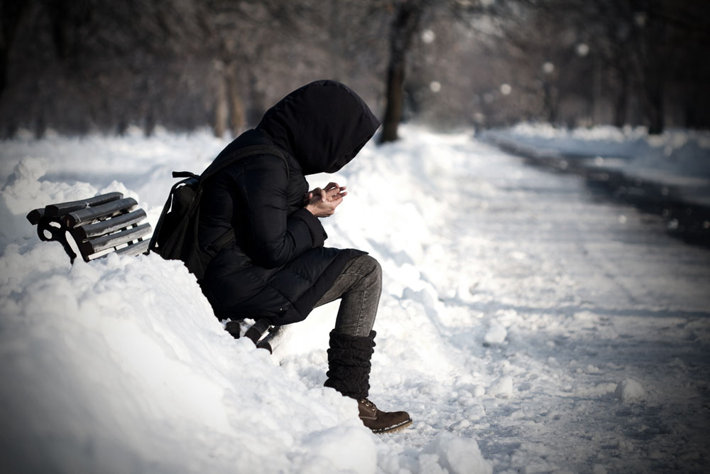Cold Weather and Cold Hearts—Why People Turn to Substance Use during Winter Months

Is there a seasonal factor in drug overdoses? New research from Brown University seems to suggest so. We’ve heard of the negative aspects of winter. We know about the uptick in depression and the poor mental outlooks that seem to get worse during cold temperatures and gray days. People tend to stay inside more in the winter. There’s not as much to do. It’s tricky to go out and be active when the roads are covered in snow.
All of that is known. And now, new data suggests that drug overdoses are even more likely to occur when the temperatures drop. That is useful data to have, as it can clue us into preventive efforts we might take during the winter months. If we know it’s happening, we can take steps to prevent it.
New Research from Brown University
As the temperatures drop and the leaves start to change, our euphoria and joy of the warm summer months are leveling down to a relaxed calm and unobtrusive enjoyment of slightly cooler weather. We're looking forward to autumn, to changing leaf colors, an extra sweater, and perhaps some hot cider. But in the back of our mind, we know what is coming just after that—the really cold weather is just around the corner. Before we know it, the snow will be flying and just getting through daily life will become more difficult.
For many people, this time of year brings with it a fair degree of moaning, groaning, and perhaps even depression. Why would it be any different for those who struggle with drug and alcohol habits? For people with drug problems, the winter is harsh. Life becomes that much more difficult, and the urge to use drugs becomes that much more pressing.
Brown University decided to unravel this thread, to see if there is a connection between weather changes and drug use. Sure enough, the research showed a 25 percent increase in fatal opioid overdoses after periods of freezing temperatures as compared to days that had an average temperature of 52 degrees.
The researchers are still working on the reasons why overdose deaths seem to go up when temperatures drop. Brandon Marshall, an associate professor of epidemiology, commented on the findings: “It is well known that opioids induce respiratory depression, and that’s what causes a fatal overdose. However, there may be a host of other risk factors that contribute to opioid overdose deaths, which could be avenues for effective interventions. Regardless of what is causing the correlation between cold weather and fatal overdoses, our findings suggest that agencies and organizations should consider scaling up harm-reduction efforts after a period of cold weather.”
The research team examined more than 3,000 opioid-related deaths that occurred in Connecticut and Rhode Island between 2014 and 2017. Their findings were pretty alarming.
Quoting a news report from Brown University’s periodical: “They [the researchers] compared the average temperature on the day of each death—and up to two weeks before—to the average temperature of three reference days in the same month. They found that an average temperature of 32 degrees three to seven days prior to day of death was associated with a 25 percent increase in the risk of fatal overdose compared to periods with an average temperature of 52 degrees.”
That statement is quite telling. People are more likely to overdose when the temperatures drop. Why is that the case? And what might we do to prevent those deaths?
Why Are Drug Users More Likely to Overdose on Cold Days?

There are many reasons why people might be more likely to overdose on cold days. Brown University cited the fact that a combination of opioid use and cold weather could create an adverse biological effect. It’s already more difficult to breathe in cold air. Opioids reduce breathing. Some opioids also reduce the temperature at which the body starts to shiver. That makes it harder for the body to regulate temperature. All of this can lead to an increased likelihood of an overdose.
Another factor is circumstantial change brought on by cold weather. Addicts are more likely to be inside, at home, and possibly alone when they use drugs in the winter. If they overdose, under those circumstances, it’s more likely they’ll die (as compared to overdosing while out and about, perhaps in public or at a party or social gathering with friends).
Addicts might also find it more difficult to get drugs during the cold months. That could lead to going days without drugs, then using a lot of drugs in one period, and then overdosing because of the sudden drug use.
And last but not least, there are the behavioral and mental implications of cold weather; no sunlight, snow everywhere, ice on the sidewalks, and so on. People might be more inclined to use substances to cope with the emotional hardships of the season, and that could lead to an overdose.
And some research says it's not necessarily just the cold weather that is a factor. Another study suggests that the simple fact of shorter daylight hours can also play a role in increased chances of suffering a fatal overdose. This has to do with a lack of sunlight leading to a deficiency in Vitamin D, and how that can lead to depression and substance abuse.
Help Your Loved One Get Drug Treatment

Now that we have the above information, we should redouble our efforts to help addicts find treatment. With the cold weather just around the corner, it might seem like the right thing to do is stay at home where it's warm. But if there are people who need help, we should put on an extra layer and go help them. If someone you know needs to get into a treatment center but doesn't know how you should do everything you can to help them enter a program.
As a final note, just because drug overdoses are more likely to occur on cold days, that does not mean we should relax our efforts to combat the drug problem during the rest of the year. There is an entire plethora of research which suggests some addicts are more likely to use drugs during the summer. And there is quite a bit of data to back up why that is.
So many factors might contribute to an overdose. If you know someone who is addicted to drugs and alcohol, make it your mission to get them help via a residential drug treatment center as soon as possible, whatever the season.
Sources:
- https://www.brown.edu/news/2019-06-17/cold-overdoses
- https://www.sciencedaily.com/releases/2019/07/190723085951.htm
Reviewed and edited by Claire Pinelli IAADC, CCS, LADC, RAS, MCAP

